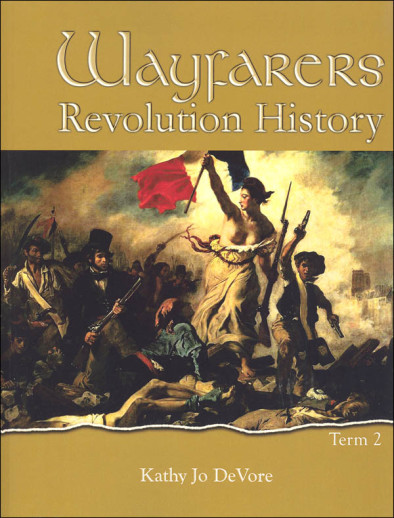We use cookies to make your experience better. To comply with the new e-Privacy directive, we need to ask for your consent to set the cookies. Learn more.
Wayfarers: Revolution History Term 2
Wayfarers is a curriculum guide which covers all basic subjects from preschool to graduation with an emphasis on quality literature, narrations, and no busywork. Other books and curricula are required to complete this program.
What is a "unit study"? Briefly, it's a thematic or topical approach to teaching as opposed to the traditional by-subject approach. Rather than teach each subject separately, a unit study attempts to integrate many or all subject areas into a unified study - usually centered around a particular subject or event. Obviously History (the study of events) and Science (the study of "things") are well-suited to unit studies, and usually form the "core" around which other subjects are integrated. Subjects like Bible, Geography, Government, English (writing), and Reading/Literature, Music, Home Economics, Life Skills, and Art, are usually easy to integrate around a core topics. Remaining subjects (Math, Phonics, Grammar, Spelling) can be integrated to some extent via related activities. Each, however, has its own "system" (progression of skills, mastery of "rules") which must be followed to some degree. Since one of the additional advantages of a unit study curriculum is the ability to use it with students of varying ages and skill levels, these subjects are generally taught apart from the core curriculum. This may be as simple as assigning pages in a grammar or spelling book, or using a separate "program" for Phonics and Math. Unit studies also tend to be more activity-oriented than the traditional approach, a real boon to kinesthetic learners. Advocates of the unit study approach site studies showing that children learn best when learning is unified rather than fragmented and when learning is more participatory than passive.
Unit Study Curriculums are "complete" curriculums based on the unit study approach that are intended to be used over a longer span of time (typically a year or more). They generally have an organized structure or flow and incorporate as many subject areas as possible. Typically, organizational materials and methods are provided along with some instruction for use. Broken into logical segments or "units" of study, they are intended to comprise the core of your curriculum.
Classical Mason may not be a term that you are familiar with, but it perfectly describes this four-year chronological guide that follows the trivium learning stages. Courses include Ancient History, Medieval History, Revolution History and Modern History. Each course is divided into 3 terms (12 weeks each) and provides a 5-day schedule for nearly all subjects. Although this is not an actual teacher guide, additional required resources for the core subjects are listed with an abundance of suggested literature for read aloud. While it may seem to be overwhelming, the authors dedicated efforts to create a schedule for PreK-12, and the teaching parents understanding of their familys educational needs makes this a well-rounded, flexible and successful guide to homeschool multiple ages. Other than grade specific math and language art lessons, children learn the same general topic with age appropriate materials. Religious studies are scheduled (which may be skipped without hindering the study).
Spine books vary by level and course. A sampling include Story of the World, H.A. Guerber books, Diana Warings History Revealed program or Susan Wise Baurs History of the _______ World, Reading Lessons through Literature, English Lessons through Literature (or Rod and Staff English), Quark Chronicles (Science), Joy Hakims Story of Science, Math-U-See, Miquon Math (younger levels), or Singapore methodology Math. Additional recommendations in science, history, geography, sex-education, nutrition, art, music, and bible are included for families to select the best fit. Please contact us for a comprehensive list for each guide. The author provides information on how to use the program, and appendices with additional literature lists, the Pathways reading program schedule (available free at authors site), dictation instruction, Montessori instruction, optional high school science spines, and a schedule for the Guerber history spines. Flexibility is built into each course, allowing you to pick and chose from the quality resources that are the best fit for your family. Since the course is designed to be cyclic, the abundance of resources means that every 4 years, you will have new resource suggestions to keep the learning interesting for students (and parent)! Worth mentioning, Science is only scheduled twice per week, and science-minded families may wish to schedule more activities from the suggested resources for a more robust science experience. Guides include a link and password to free online extras to enhance your studies, for example maps, coloring pages, etc.
Providing an excellent marriage of Classical Education and the Charlotte Mason philosophy to meet the needs of homeschooling different age groups, this course makes it is possible to have it all! With the flexibility these courses offer, I encourage you to look at the expansive PDF samples available. Grab your favorite highlighter and study the introduction, preview the book lists and highlight the options that best fit your family. It is possible to confidently create the perfect path for your family! Each guide approximately 250 pgs, pb. ~ Deanne
- History Based Complete Curriculum Guide with daily lesson plans.
- Designed to teach all your children together.
- Cyclic approach to history.
- Quality spine resources and literature recommendations to take the guesswork out of your planning.
| Product Format: | Paperback |
|---|---|
| Brand: | Kathy Jo DeVore |
| Author: | Kathy Jo DeVore |
| Grades: | PK-AD |
| ISBN: | 9781516985883 |
| Length in Inches: | 11 |
| Width in Inches: | 8.5 |
| Height in Inches: | 0.625 |
| Weight in Pounds: | 1.4 |

